Why You Should Never Use Your GPS During a Snowstorm, Officials Warn
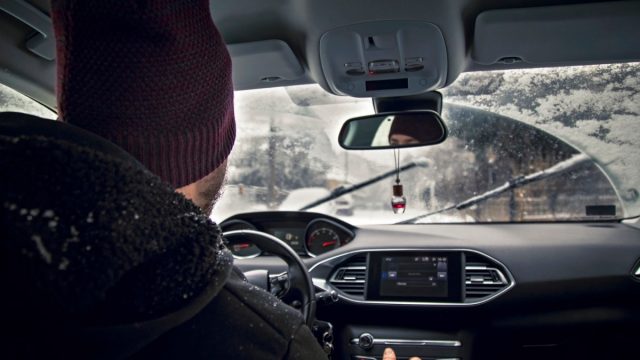
The winter weather has wreaked its fair share of havoc this season, with states across the country getting hit by snowstorms over the last two months. But no matter how experienced you are with these hazardous conditions, there might be some safety recommendations you’re less familiar with. With that in mind, officials in different states have recently warned drivers against using their GPS devices during snowstorms. Read on to discover the driving mistake that could put you in harm’s way.
READ THIS NEXT: 5 Winter Travel Mistakes to Avoid.
Officials have been warning drivers not to use their GPS during snowstorms.
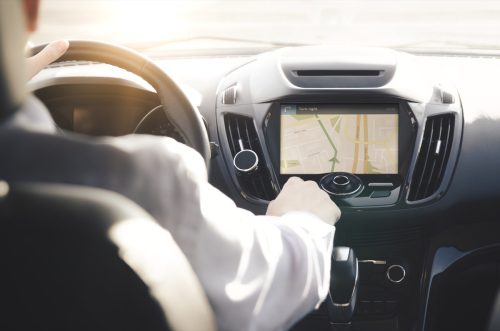
Travelers are being asked to think twice before relying on digital navigation devices during the winter.
Most recently, the Colorado State Patrol (CSP) warned against this common practice, with the troop in Limon, Colorado, advising drivers to get off the road instead of following their GPS down alternate routes when main roadways are closed or backed up for snowstorms.
“Find a town to stop in, a restaurant, truck stop or hotel and wait it out,” the Limon Troop wrote in a Jan. 17 post on its official Facebook page.
But it’s not only Colorado state officials warning about this. “We are once again urging travelers to not blindly follow their GPS devices to navigate around road closures in winter storms,” the Jackson County Roads Department in Oregon wrote in a Nov. 2022 alert on its website.
Travelers have gotten stuck in dangerous situations because of GPS.
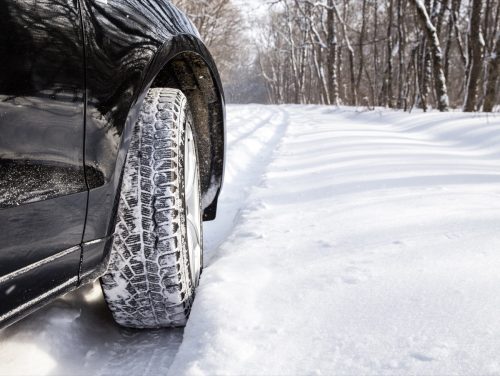
During Colorado’s last snowstorm, navigation apps led motorists off the main roadways once they were closed, according to the Limon Troop. Many drivers who were expecting to bypass road closures by using their GPS machines were met with worse outcomes.
“The new routes can lead drivers down county roads that are not maintained,” the CSP’s troop explained on Facebook. “During the last blizzard, several people were stuck in drifts, or deep snow for hours or even days in extreme circumstances.”
Similar scenarios have played out in Oregon, the Jackson County Roads Department revealed. When Interstate 5—one of the state’s major highways—is closed for severe snow conditions, drivers end up diverted onto Colestine Road by their GPS. But instead of continuing with their journey this way, they could spend “most of the night waiting for Jackson County Search and Rescue and County Road Department employees to rescue them,” according to the department.
“Colestine Road is a narrow, very steep, gravel road that is unmaintained during evening hours,” the Jackson County Roads Department explained. “The route is signed as not being maintained after dark in the winter, yet drivers continue to use this route as a bypass in bad weather. It isn’t a bypass—don’t trust your GPS!”
For more safety advice delivered straight to your inbox, sign up for our daily newsletter.
Experts say it’s best to avoid backroads altogether in bad weather.
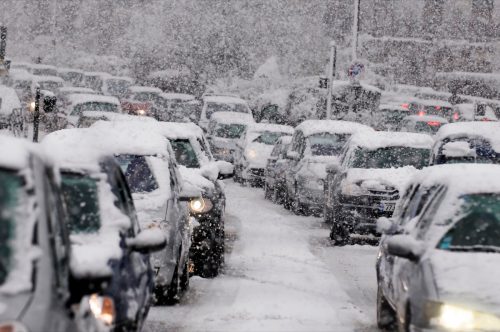
The Limon Troop advises drivers not to follow navigation devices down “dangerous routes” during snowstorms no matter what. “A good rule of thumb is if the highways or interstate is closed, the county roads will be impassable as well,” the CSP troop wrote on Facebook.
William Baldwin, a driving expert and the founder of AutoGlobes, explains that most GPS devices aren’t equipped to consider these hazards when automatically suggesting alternate routes.
“While navigation devices and apps are great for finding faster routes, you can’t rely on them to lead you to a safe route during inclement weather,” he tells Best Life. As a result of this, your GPS might direct you onto to backroads and local roads, even though they are “usually the last to be cleared during snowstorms,” according to Baldwin.
“If you heed your GPS’ advice to get off the highway, you could get stuck on a road with deep snow, and you might not get help fast,” he says. “So, if you have to use your GPS to get to your destination during a snowstorm, just make sure not to follow its recommendation to take a backroad. Stay on the highway even if it means getting stuck in traffic. That’s safer compared to being stranded in the middle of nowhere.”
You should also keep an emergency kit stored in your vehicle.
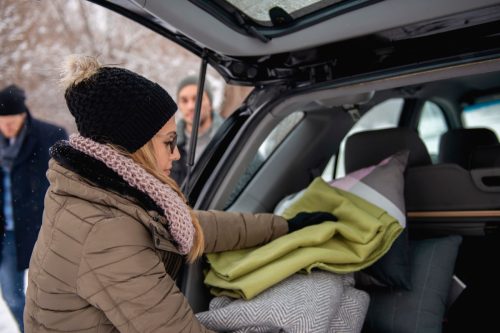
If you know a snowstorm has or could prompt road closures, the “safest thing” you can do overall is to avoid heading out on the road to begin with, according to Eric Peterson, an experienced travel guide and founder of The Savvy Campers.
“I recommend checking the road conditions in the area before heading out,” he says. “This can be done by checking the weather reports and consulting local state highway inspections.”
But if you have no other choice or you’re already out on the road when severe weather strikes, it’s important for you to have safety tools stored away in your car for you to turn to.
“Always travel with a winter emergency kit during cold seasons,” says Rick Musson, a 21-year law enforcement officer and a traffic safety consultant with 4AutoInsuranceQuote.com. “That way, if you’re stuck on the highway during a snowstorm, you have food, water, blankets, and necessary medication accessible.”